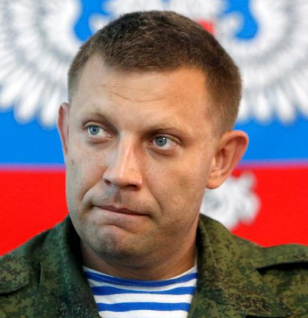MOSCOW/KIEV (Reuters) – The leader of Russian-backed separatists in the Donetsk region in eastern Ukraine was killed in an explosion at a cafe on Friday, prompting Russia to accuse Ukraine of assassinating him while Kiev blamed separatist infighting.
Russia’s foreign ministry accused Ukraine of killing the separatist leader, Alexander Zakharchenko, to try to unleash a renewed war in eastern Ukraine, but Kiev said it had nothing to do with the blast.
An aide to Zakharchenko said the rebels had seen an increased movement of Ukrainian armoured vehicles heading towards the separatist region, RIA news agency reported, a claim rejected by Ukraine’s military.
Russian President Vladimir Putin called the killing a “dastardly” crime aimed at destabilising a fragile regional peace, but he did not accuse Kiev of being behind it.
Zakharchenko, who led the self-proclaimed Donetsk People’s Republic since 2014, “received injuries incompatible with life as a result of an explosion in the centre of Donetsk,” the separatist administration said in a statement.
Russian-backed rebels threw off Ukrainian central rule in an armed uprising after pro-Western leaders opposed by Moscow came to power in the Ukrainian capital, Kiev, in 2014.
A shaky internationally-brokered ceasefire has been in force since 2015, halting large-scale fighting, though there are still frequent outbreaks of shooting on the front line between the separatist and Ukrainian forces.
In a telegram of condolences released by the Kremlin, Putin praised Zakharchenko as a true popular leader and a patriot.
“The dastardly killing of Alexander Zakharchenko is further evidence: those who have chosen the path of terror, violence and spreading fear do not want to seek a peaceful political solution to the conflict,” he said. He did not say who these people were.
Russia’s Foreign Ministry had every reason to believe Kiev was responsible for Zakharchenko’s death, ministry spokeswoman Maria Zakharova said on the Rossiya-24 state television station.
Russia’s Investigative Committee, the state body that handles major crimes, said it was treating the killing as an act of international terrorism.
In Kiev, a spokeswoman for the state Security Service, Yelena Gitlyanskaya, dismissed Moscow’s accusations, saying the killing was a result of years-long “internal fighting… between the terrorists and their Russian sponsors”.
Denying a rebel claim of increased military activity by Kiev’s forces, an officer in Ukraine’s Joint Forces Operation said: “Everything is operating in a routine fashion. This (claim) is either fake or they are preparing for something.”
Ukraine’s General Staff declined to comment on the matter.









